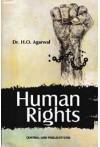- Author(s): Dr. H.O. Agarwal
- Publisher: Central Law Publications
- Edition: 18 Ed 2023
- ISBN 13 9789390735976
- Approx. Pages 440 + contents
- Format Paperback
- Approx. Product Size 24 x 16 cms
- Delivery Time 3-5 working days (within Kerala & South India) (Others 7-9 days)
- Shipping Charge Extra (see Shopping Cart)
.............................................................................................................................
Description
Dr. Agarvval must be congratulated for bringing out a very timely publication on "Implementation of Human Rights". Today the world over, there is considerable' discussion on human rights and various United Nations bodies and non-governmental organizations are concerned about the implementation of human rights. But before we talk of implementation of human rights, it is necessary to understand what are human rights and what is their broad meaning and content. The term 'human rights' is a new formulation of the classic phrase "the rights of man". Its first use seems to have been made by Franklin Roosevelt in his famous message to Congress in January 1941 calling for a world founded on four essential freedoms. These he listed as freedom of speech, freedom of religion, freedom from want and freedom from fear. In the course of his for freedom message, the President declared : "Freedom means the supremacy of human rights everywhere. Our support goes to those who struggle to gain these rights or keep them." The phrase "human rights" was us again in the Atlantic Charter and the same formula was repeated strictly thereafter in the Declaration of the United Nations signed on 1st January, 1942. Then came the Dumbarton Oaks' proposals on the basis of which the San Francisco Conference prepared and opened the Charter of the United Nations. The Charter referred to human rights in its Preamble and in six different articles and this concern of the United Nations in the promotion and encouragement of respect for human rights and fundamental! freedoms was translated in the Universal Declaration of Human Rights adopted by the General Assembly on 10th December 1948. The learned author has dealt in great detail with the provisions contained in the Universal Declaration of Human Rights and analysed its provisions in depth and shown its impact on the future of development of human rights as also on the constitutions of newly emerging States. The Universal Declaration is like "the vast gateway of a temple". Its preamble has been aptly described by Rene Cassin as the forecourt containing the general principles of liberty, equality, non-discrimination and fraternity. There are, as observed by him, four columns; first, personal rights; second, the rights of the individual in his relationship to the outside world, the community ; third, political rights and fourth, economic, social and cultural rights. Rene Cassin regards these four columns as surmounted by a pediment linking the individual with the society.
.............................................................................................................................
Contents
Chapter 1 Concept of Human Rights
Chapter 2 Universal Declaration of Human Rights
Chapter 3 International Covenants on Human Rights
Chapter 4 International Covenants on Inhuman Acts
Chapter 5 Vulnerable Groups and Human Rights
Chapter 6 International Conferences on Human Rights
Chapter 7 Collective Rights
Chapter 8 Regional Conventions on Human Rights
Chapter 9 Human Rights and Non-Governmental Organisations
Chapter 10 International Humanitarian Law
Chapter 11 India and International Covenants
Chapter 12 India and Human Rights Conventions
Chapter 13 Human Rights Commissions in India
Appendices
1. Universal Declaration of Human Rights (1948)
2. International Covenant on Economic, Social and Cultural Rights (1966)
3. Optional Protocol to the International Covenant on Economic, Social and
Cultural Rights (2008)
4. International Covenant on Civil and Political Rights (1966)
5. Optional Protocol to the International Covenant on Civil and Political Rights (1966)
6. Second Optional Protocol to the International Covenant on Civil and Political Rights
Aiming at the Abolition of Death Penalty (1989)
7. Instrument of Accession by India to the Human Rights Covenants (1979)
8. The Protection of Human Rights Act (1993)
9. The Protection of Human Rights (Amendment) Act (2006)
Index
.............................................................................................................................
Author Details
Dr. H.O. Agarwal, Formerly Professor, Faculty of Law, University of Allahabad.

